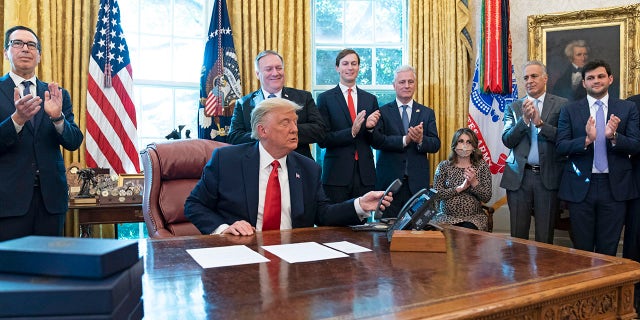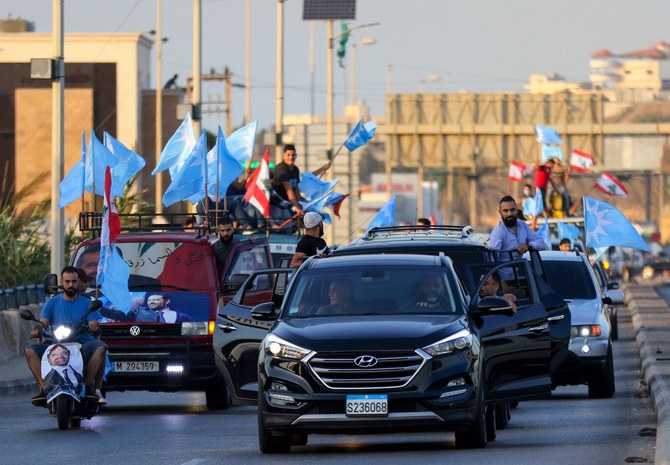The daughter of Lebanese President Michel Aoun Raoukouz and chairman of the National Committee for Women in Lebanon, Claudine Aoun, said in …

By By Kate Scanlon -- Washington, D.C. Newsroom, (CNA).- As Lebanon continues to deal with fallout from the massive August explosion that devastated parts of the capital, Beirut, advocates for Lebanese Christians call for continued U.S. aid and collaboration with local NGOs, while one State Department official says that conversations about additional aid have stalled. On Oct. 19, the Daily Star, an English-language newspaper in Beirut, reported that US Secretary of State Mike Pompeo told Lebanese President Michel Aoun by phone that the United States would send additional aid to rebuild areas damaged by the port explosion in Beirut earlier this year. An official State Department read-out of the call between the leaders did not mention such a pledge, and a spokesperson for the State Department did not return a request for comment on whether Pompeo had pledged additional aid to the president, but an official within the State Department said conversations about a second round of aid have stalled within the government.
Lebanese authorities attributed the Aug. 4 blast in the port of the country’s capital and largest city to “highly explosive material stored unsafely.” The explosion left 190 dead, more than 6,500 injured, and three people missing, as well as approximately $15 billion in direct damage. In the aftermath of the explosion, the United States pledged more than $17 million in initial aid for Lebanon for food assistance and medical supplies. Some advocates called for additional relief funds in response to the disaster, pointing to approximately 300,000 people officials said have been displaced from their homes. Al Jazeera reported 70,000 homes were among the buildings damaged in the explosion. Advocates for Lebanese Christians told CNA that funds dedicated specifically to reconstruction were vital, because much of the damage occurred in neighborhoods with a Christian majority. If these Christians are unable to return to their homes, it could shift the demographics of the city—and the country—by destabilizing the Christian community there.
They also stressed that working with established partners in NGOs would safeguard funds from Lebanon’s corrupt government. A State Department spokesperson told CNA that the U.S. government provided more than $750 million to Lebanon last year, and that the United States has provided more than $41.6 million in supplemental foreign assistance and redirected $11.5 million in USAID Mission funding to help Lebanon respond to the COVID-19 crisis. According to data from the Department of State, the United States has provided more than $4 billion total in foreign assistance to Lebanon since 2010. “American assistance to Lebanon saves lives, strengthens our strategic partners, ensures key services reach the Lebanese people and refugees, and counters Hezbollah's narrative and influence,” the spokesperson said in an email. The spokesperson added that the U.S. government “directly supported the Lebanese people in the aftermath of the port explosion,” by providing “immediate humanitarian assistance to meet emergency needs,” including emergency food, shelter, and medical assistance. “We continue to work with our partners in Beirut to identify additional recovery needs,” the spokesperson said.

By Morgan Phillips | Fox News -- President Trump on Friday announced a peace deal that would normalize ties with between Israel and Sudan, claiming there "would be many more peace deals to come in the Middle East." Trump invited reporters into the Oval Office while he was on the phone with the leaders of Israel and Sudan to discuss the latest U.S.-brokered deal in the run-up to Election Day. "Three months ago, no one thought this was possible. Even Bibi didn't know if this was possible, right Bibi?" Trump asked his ally, Israel Prime Minister Benjamin Netanyahu. Trump said Sudan had demonstrated a commitment to battling terrorism. "This is one of the great days in the history of Sudan," Trump said, adding that Israel and Sudan have been in a state of war for decades. "It is a new world," Netanyahu said over the phone. "We are cooperating with everyone. Building a better future for all of us." The president said that at least five other countries wanted peace with Israel. "We have many lined up. They want to come in, get the deal done."
"Iran ultimately will become a member of this whole thing. Look, someday I'd love to help Iran get back on track. They've gone from a rich country to a poor country in three years," he said. "But they can't have nuclear weapons," he continued. "It's always death to Israel, that's all they shout. So they can't have nuclear weapons." The president also said that a deal between Israel and the Palestinian region may be on the horizon. "Palestinians, they're wanting to do something. "I'm sure that will get done, too." Before the 2020 peace deals, Middle Eastern nation had not recognized Israel since Jordan in the 1990s. Trump said he expects Saudi Arabia to come to the table for a deal soon. "There's going to be a big reunion, where everybody is here, everybody's going to be signed. We expect Saudi Arabia's going to be one of those countries. Highly respected. The King and the Crown Prince. They're all just highly respected in the Middle East."

by Dr. Dania Koleilat Khatib -- arabnews.com -- Almost exactly a year after his resignation due to the popular protests in Lebanon, Saad Hariri is back to form a new government. President Michel Aoun last week designated him to form his fourth government. If there is anything one can conclude from this entire issue, it is that the Lebanese political class has not been influenced by the mass protests, that it will not change its behavior, and that the old guard still insists on the same sectarian-based power-sharing structure that has dragged the country into the abyss. The irony is that Hariri has promised a government of independent technocrats — but only, of course, as long as they are nominated by the sectarian political parties. Hezbollah is not showing any flexibility and is imposing its terms while pretending to comply with the French initiative. Hariri seems set to accept Hezbollah and its ally Amal’s demands; namely their control of the Ministry of Finance. In return, Hariri will probably name the Sunni ministers and Gebran Bassil the Christian ministers. In a nutshell, Lebanon will be back to square one. Hariri is trying to reset the situation to that of before Oct. 17, 2019, when the mass protests began. However, this is not possible because the people have changed and society has changed. Therefore, the proposed political structure no longer fits the collective Lebanese frame of mind. Hariri is also hoping that he will be able to stop the collapse of the political system by garnering international support. However, the international community is holding its ground: No aid until reforms are conducted. The current political elite cannot conduct reform because it thrives on corruption and profiteering. It was through corruption and profiteering that they were able to enrich themselves and build a base.
Every politician is taking over the denomination he represents and, in the name of that denomination, is taking over some government facilities. So you see him dealing with the government’s institutions and departments as if they belong to him or his political party. This means he allows himself to employ his followers in a department he controls, even if they do not have the required credentials, in order to retain their loyalty. The effrontery of the political system has reached the point where an applicant to a government post either needs to pay a sum to the politician who controls the department or get his blessing — “wasta” as they call it in Lebanese slang — in order to get the position. This system pushes the employee to look at the job as a “droit acquis” (acquired right). Those who have paid for it view it as an investment, therefore legitimizing the job as a form of return on their bribe. Those who got it because of a connection to the politician or their “wasta” know that they are above the system of accountability, so they take the job for granted and only come to work at the end of the month to get their pay. This is how corruption is spread across the different levels of the state. It is impossible to solve this problem unless measures are taken regarding the political helm — i.e., unless the current sectarian power-sharing system is changed.
Khazen History


Historical Feature:
Churches and Monasteries of the Khazen family

St. Anthony of Padua Church in Ballouneh
Mar Abda Church in Bakaatit Kanaan
Saint Michael Church in Bkaatouta
Saint Therese Church in Qolayaat
Saint Simeon Stylites (مار سمعان العامودي) Church In Ajaltoun
Virgin Mary Church (سيدة المعونات) in Sheilé
Assumption of Mary Church in Ballouneh
1 - The sword of the Maronite Prince
2 - LES KHAZEN CONSULS DE FRANCE
3 - LES MARONITES & LES KHAZEN
4 - LES MAAN & LES KHAZEN
5 - ORIGINE DE LA FAMILLE
Population Movements to Keserwan - The Khazens and The Maans
ما جاء عن الثورة في المقاطعة الكسروانية
ثورة أهالي كسروان على المشايخ الخوازنة وأسبابها
Origins of the "Prince of Maronite" Title
Growing diversity: the Khazin sheiks and the clergy in the first decades of the 18th century
Historical Members:
Barbar Beik El Khazen [English]
Patriach Toubia Kaiss El Khazen(Biography & Life Part1 Part2) (Arabic)
Patriach Youssef Dargham El Khazen (Cont'd)
Cheikh Bishara Jafal El Khazen
Patriarch Youssef Raji El Khazen
The Martyrs Cheikh Philippe & Cheikh Farid El Khazen
Cheikh Nawfal El Khazen (Consul De France)
Cheikh Hossun El Khazen (Consul De France)
Cheikh Abou-Nawfal El Khazen (Consul De France)
Cheikh Francis Abee Nader & his son Yousef
Cheikh Abou-Kanso El Khazen (Consul De France)
Cheikh Abou Nader El Khazen
Cheikh Chafic El Khazen
Cheikh Keserwan El Khazen
Cheikh Serhal El Khazen [English]
Cheikh Rafiq El Khazen [English]
Cheikh Hanna El Khazen
Cheikha Arzi El Khazen
Marie El Khazen